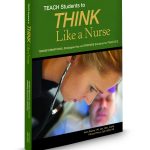
A generation ago Art Linkletter wrote a book titled “Kids Say the Darndest Things,” and Bill Cosby hosted a TV show with the same title from 1998-2000.
Kids aren’t the only ones who say the darndest things; nursing students can also say the darndest things as well!
In the Facebook group Teachers Transforming Nursing Education that I am an admin for and respond to many of the questions educators post, a recent post blew up.
An educator asked the group to share awkward or strained communication or comments that students have said that elicited a strong response.
It hit a raw nerve because in a short period of time over 100 comments were posted by other educators.
I gleaned some of the comments from this post to let you know that your students are likely not that much different regardless of where you teach.
But more importantly, I share these comments so you can take a minute to pause, reflect, to have a prepared response to these statements, but also identify what students may be trying to communicate when nursing students say the darndest things!
Classroom Comments
“Do we really need to know that?” If you are an educator who is teaching NEED to know content relevant to the real-world practice of first-year generalist nursing practice, then your emphatic statement is “Yes, you really need to know this!”
But if infobesity is present in your content, and are teaching to the test, and communicating that everything in the chapter is NEED to know and will be tested, then this is a relevant question that a student has the right to ask. Because no, there is content that you do not need to know as a student.
“Of what you covered today, what is important?” This is a variation of the first question. If you have eliminated infobesity and put your content on a needed diet, then reply, “Yes, everything I have taught today is important!”
“Is this going to be on the test?” Students are stressed, and sometimes educators can unknowingly contribute to this stress by burdening them with TMI and expecting them to know everything in a chapter as fair game for a test.
Instead, make it a priority to lecture no more than 20-25” on essential content relevant to first year generalist practice. Communicate that 80% of the test will be on this content, then flip to an active learning strategy that requires the application of content to practice, such as a good case study.
Communicate that the other 20% of the test will address content not covered in class but will require students to read the rest of the chapter.
“I had to purchase a textbook but I never used it or took it out of its wrapper.” Why are many students getting everything they need to know from your lecture and not have to purchase a textbook? If you communicated expectations and implemented the principles from the last question, this problem would take care of itself.
Remember that education is a 50-50 responsibility…faculty do their best to teach well and students must apply themselves by reading and studying both the textbook and your classroom content.
“I’m paying for this…you work for me,” Ouch! This is disrespectful student incivility that needs to be respectfully and directly addressed in private. Communicating the fallacy of this logic and the expectations of professional conduct and behavior hopefully addressed in the student handbook should nip this in the bud.
Disrespectful, uncivil behavior by students or faculty is like cancer. It replicates if not treated. Do what is needed to excise this tumor if it exists in your program in any way.
If student incivility is a problem in your program, use the case study “Student-to-Faculty Incivility” to address the elephant in the room and promote a culture of respect and civility.
Action Steps
- Clearly communicate expectations. Be frank and provide in writing and specific examples what is expected and what NOT to do from the beginning of the program.
- Emphasize DEEP learning of what is MOST important. Remember that you are teaching and training first-year generalist nursing students. Identify essential content relevant to practice, then go deep with application so your students can apply this content to the bedside where it matters most!
- Create a culture of respect. Address student incivility head-on when it manifests. But also do your part to create a culture of respect towards students by valuing them and responding directly in all interactions.
- Join the Facebook group Teachers Transforming Nursing Education. I am so proud of this group of over 1600+ educators who provide an online community to support and encourage one another with real-life struggles/challenges only a fellow nurse educator would understand. It is a closed group, so answer at least one question to let me know you are a nurse educator and are set to participate any way you choose and need!
In Closing
Have you experienced any of these student comments as an educator? If so, how did you respond?
Take a moment to reflect to determine if your style of teaching or the amount of content you are expecting students to learn is realistic and causing an unexpected burden to your students.
Be willing to embrace change and transform the way you teach by making learning active and emphasizing the application of content to the bedside.
Nursing education will always be difficult and challenging, but there are things that both educators and students can and must do differently to bring about the radical transformation that is still needed in nursing education.
Finally, have a prepared response that respectfully and directly addresses the real issue when students say the darndest things!
Coming Next Blog: Part II: When Students Say the Darndest Things in Clinical
Transform the Way You Teach!
I wrote TEACH Students to THINK Like a Nurse to be a written guide to help educators transform the way they teach by putting content on a diet and engaging students with active learning.
Related YouTube!
Keith Rischer – PhD, RN, CEN
As a nurse with over 35 years of experience who remained in practice as an educator, I’ve witnessed the gap between how nursing is taught and how it is practiced, and I decided to do something about it! Read more…
The Ultimate Solution to Develop Clinical Judgment Skills
KeithRN’s Think Like a Nurse Membership
Access exclusive active learning resources for faculty and students, including KeithRN Case Studies, making it your go-to resource.




